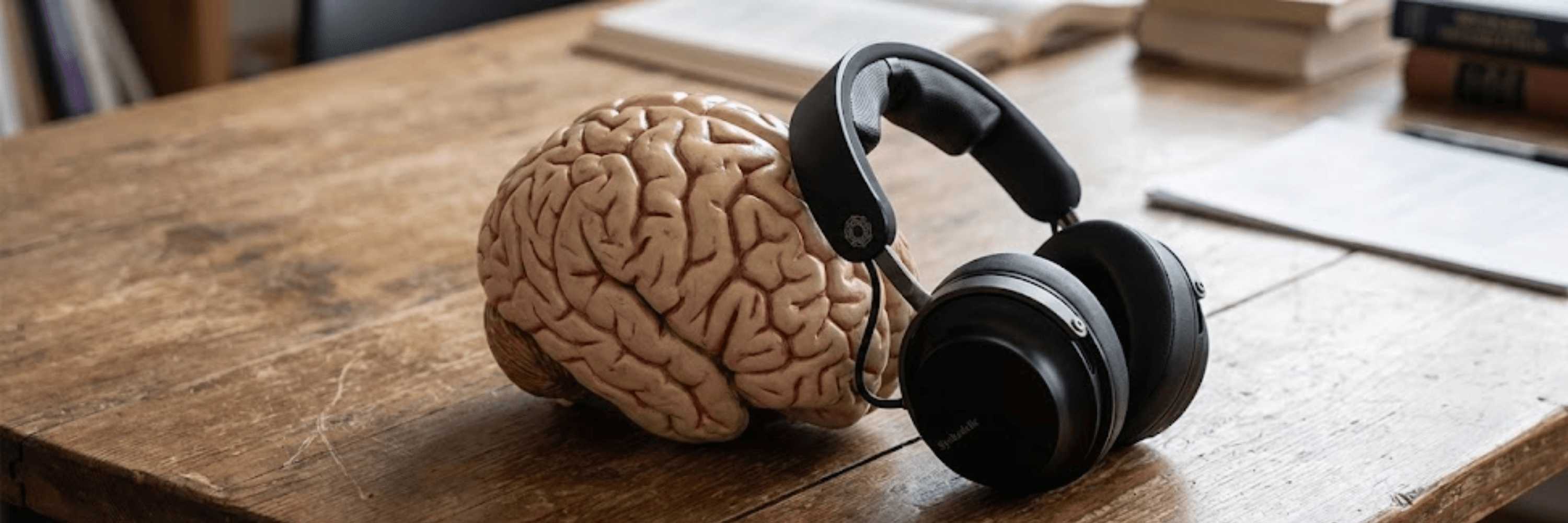Cold plunges at 5 AM.
Running marathons every few months.
Or, following Bryan Johnson’s 100+ step anti-aging routine.
One thing is clear - the obsession with holding on to your youth is real.
And hey, we get it. No one looks forward to growing older, especially if it means losing your memory, independence, or that razor sharp wit you flaunt every now and again.
But here’s the thing: living a longer life doesn’t have to involve a team of doctors or a futuristic fridge full of supplements. There’s a far simpler, science-backed way to slow down the clock and live better - taking care of your cognitive health.
Let’s unpack how cognitive health shapes the way we age, why it’s deeply tied to longevity, and how to improve it starting now. No cryo chambers required. Smart headphones, though? Might help.
What is cognitive health?
Yes, yes -- we’re all eager to skip to the good part. The ‘how’ to live longer, stay sharper, and maybe even hack the way back to our youth. And sure, you could scroll to the end of this blog and get some quick answers. But trust us - the "what" and "why" are where it gets interesting.
Let’s start at the root.
Cognitive health is your brain’s ability to think, learn, remember, make decisions, and solve problems. If it involves getting through daily life, your cognitive health is involved. From paying bills to remembering gym directions to figuring out what “2x speed” means when your favourite podcaster is on chipmunk speed - it’s all cognition.
It includes:
- Attention – Your ability to selectively focus on one or few things.
- Memory – Both short-term (“Where are my keys?”) and long-term (“What was my first email password?” - if you remember that, hats off).
- Language – Talking, comprehending, processing what others say.
- Executive function – Planning, organising, problem-solving, making decisions.
- Processing speed & perception – Making sense of what’s happening around you, and reacting accordingly.
Suggested Read: 5 tips on reducing brain fog and increasing focus
When all these functions work well together, life feels more manageable, you feel more ‘you’. When they’re off, you might feel like the day slipped through your fingers, or like you’re just a bit out of sync. And that’s your cognitive health, or lack thereof, talking.
Sure, some cognitive slowing is normal with age, but the speed and severity of decline? That depends on how well you support your brain.
The exciting part? Cognitive health isn’t fixed. You can strengthen it, protect it, and keep it sharp.
What is Brain Health?
We can’t really talk about cognitive health without first talking about the brain.
If cognitive health is what you notice on the outside - your problem-solving skills, your focus, your decision-making - brain health is what’s going on under the hood.
In simple words - it’s the health of the physical structure of the brain - y’know the organ that keeps everything else running. Nothing major.
It includes:
- Emotional regulation – How you handle stress and stay emotionally steady.
- Sensory and motor function – Movement, vision, coordination.
- Sleep cycles – The brain does its cleanup while you rest.
- Neurochemistry – Dopamine, serotonin, and other key neurotransmitters that affect everything from mood to attention.
Suggested Read: Bend Time to Your Will and Get More Done with These Unconventional Ways
When your brain health is in check, your mental responses are steady and quick. You stay on top of tasks, follow conversations, and respond quickly. Your body and mind move together. There’s a flow.
When it’s not? You forget what you were doing, feel too wiped out to exercise, or react to a beat too late. Even small things start to feel harder than they should.
Cognitive health and brain health sound the same? That’s because cognitive health doesn’t work in isolation. It depends on your brain’s well-being. Take care of the brain, and cognition follows.
Why is cognitive health important?
The importance of brain and cognitive health is directly linked with the way we view longevity. Living longer has less to do with age, and everything to do with holding on to your youth, both mentally and physically.
Be honest: would you actually want to live longer if those extra years came with confusion, forgetfulness, or struggling to do the basics on your own?
Didn’t think so.
Cognitive health plays a huge role in both the quality and length of your life. Studies show that cognitive decline can predict early death more accurately than some physical health issues.
One study published in Neurology Journals found that older adults with lower cognitive performance had shorter life expectancy even when their heart health and mobility were considered strong.
Another study from the Journal of the American Geriatrics Society found that those with strong cognitive function had a 25% lower risk of death over the next decade.
So why does this matter?
Because your brain pretty much runs the show. It affects how you make choices, form habits, or take care of yourself. Great cognitive health might help you:
- Follow medical advice properly
- Avoid risky situations
- Manage long-term health conditions
- Stay socially connected
- Remain independent
In simpler words - when your mind is active, agile and healthy - the rest of your life tends to function smoothly. Cognitive health isn’t just about staying alive -- it’s about staying capable.
Suggested Read: The Kind of Music the Top 1% Listen to
Cognitive health and older adults

Getting older? That’s a part of the hand we’ve been dealt. But losing grip on who you are? That doesn’t have to be.
Yes, the brain slows a bit with age. You might forget why you walked into a room (don’t worry - happens sometimes at 25, too), or take a second longer to recall a name. But that doesn’t mean extreme cognitive decline is inevitable.
Because here’s what most people don’t realise: the brain isn’t “done for” just because you’ve crossed a certain age bracket.
It’s still changing. Neuroplasticity doesn’t shut off after 40, or 60, or even 80. Your brain keeps building connections, rewiring, adjusting, if you let it.
It wants to be challenged. Learning new things, engaging with puzzles or art or even new people - that kind of mental stimulation can push back the clock on cognitive decline.
And no, it’s not “too late.” Maybe you didn’t meditate or eat like a Blue Zone monk in your 30s. That’s okay. Your brain still benefits from what you do now.
Older adults with strong cognitive health often move through life differently. They’re more confident. They stay connected. Some work out at the gym at 70, travel the world, pick up new languages, and still feel like themselves, even as everything else changes.
In fact, older adults who maintain cognitive function have fewer hospital visits, experience less depressive symptoms, and report a stronger sense of purpose. And that last part - it really matters.
Because in the end, staying fully present in your life matters the most.
Suggested Read: They Designed Your Screens to Ensure You Fall Behind—It’s Working
How to improve cognitive health?
For those who skipped to this part (we're judging you), skimmed through the blog (no judgment), or read every word - welcome to the part you've been waiting for: the "how."
We’ve said it more than once, but it’s worth repeating. You. Can. Improve. Your. Cognitive. Health. You can train your brain the way you train your body - with regular effort, some structure, and a little patience. So if you’re ready to do the work, here’s where to begin:
Use brain-training apps
Brain games aren’t just gimmicks anymore. In 2025, you’ve got apps that use AI to personalise mental workouts. These aren’t about high scores - they’re about working on focus, memory, and problem-solving in ways that actually adapt to how your brain performs.
Think of it as a gym for your mind. Five to ten minutes a day is enough to start making a difference.
Make smart tech work for you
Remember when '2025' was a concept year where we'd be enjoying tech to another level? Well, folks, you're here - make use of the tech that'll make you smarter. Devices like smart headphones that increase your focus and support genuine brain rest are here. Make the best use of them to maintain, and maybe even improve, your cognitive health.
Move more
Exercise and brain health are more connected than most people realise. Getting your heart rate up increases blood flow to the brain and helps it build new connections. It’s not about running marathons. Walking, dancing, stretching, swimming - all of it, and more - counts.
Eat like you’re fuelling your brain
You don’t need a complicated diet. Just a smarter one.
The MIND diet, a hybrid of the Mediterranean and DASH diets, is proven to lower the risk of Alzheimer’s when followed consistently.
Stock up on:
- Leafy greens (think spinach and kale)
- Berries (yes, blueberries do count)
- Whole grains
- Olive oil
- Fatty fish like salmon
Cut back on: ultra-processed foods, sugary snacks, and anything deep-fried on impulse.
Prioritise sleep
During sleep, the brain clears out toxins and consolidates memories. Poor sleep has been directly linked to memory loss, mood disorders, and cognitive dysfunction.
Pro tip: Stick to a consistent sleep schedule. Adults need 7–9 hours.
The formula to longevity isn’t locked inside a cryo tank or tucked behind an expensive supplement stack. It’s in your brain - and how well you take care of it.
Cognitive health isn’t just about staying sharp. It’s about staying independent, connected, and fully present in your own life. Whether you’re 35 or 75, the choices you make today lay the foundation for a stronger, more resilient, agile brain tomorrow.
So move. Sleep. Stretch. Talk to people you love. And yes - eat the blueberries, walnuts and what nots.
Not because it’s trendy. But because your current and future self deserves nothing less.
FAQs
What are some examples of good cognitive health?
When your cognitive health is strong, everyday things feel easier. You can focus, remember plans, solve problems, and adapt to change without feeling foggy or drained. Your brain feels like it's working with you, not against you.
What are the signs of cognitive decline?
Forgetfulness, trouble finding words, feeling confused about time, or getting lost in familiar places - these are common early signs. If they become frequent or start interfering with daily life, it's time to take note.
What’s the best diet for cognitive health?
The MIND diet - a mix of the Mediterranean and DASH diets - is one of the best. It focuses on greens, berries, whole grains, olive oil, and fish, and it’s been shown to reduce the risk of Alzheimer’s.
References
What vitamins are good for memory?
Key ones include:
- Vitamin B12 – for nerve and brain function
- Vitamin D – supports memory and mood
- Omega-3s – reduce inflammation, support cognition
- Magnesium – aids focus and sleep
Always talk to a doctor before adding supplements.
References
(The Role of Vitamin B12 and Cognitive Impairment)
(Vitamin D’s Link to Cognitive Function)
More in Recovery













